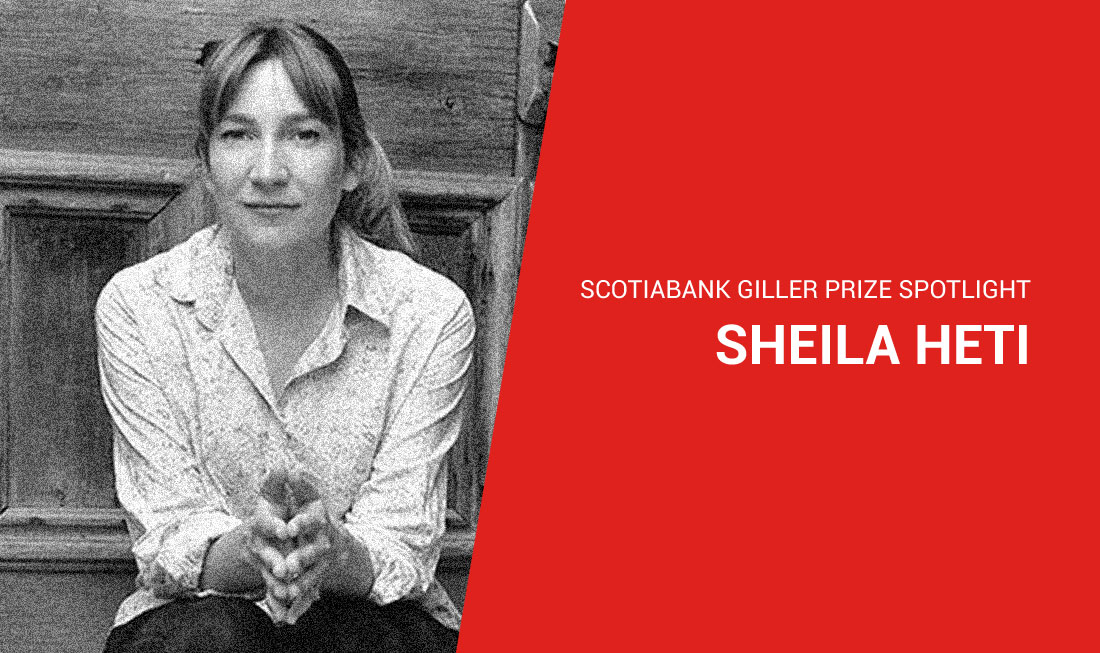Scotiabank Giller Prize Spotlight:
Sheila Heti
Sheila Heti
September 22, 2018
Sheila Heti is the author of seven books, including the novel How Should a Person Be? which was named a New York Times Notable Book; the story collection The Middle Stories; and the novel Ticknor. Her books have been translated into twelve languages, and her writing has been featured in various publications, including the New York Times, London Review of Books, the New Yorker, n+ 1, McSweeney’s, Harper’s and the Believer. She lives in Toronto.
Sheila has been selected for the Scotiabank Giller Prize longlist for her novel, Motherhood.
Where is your favourite place to write?
My apartment, either on the couch or in my bed.
Is there an activity you do to help inspire your writing?
Writing inspires more writing. When you have gotten lazy and aren’t writing, you just don’t write. But if you are writing, that inspires more writing. Reading does, too. But not reading the internet.
Do you have a tradition for every time you finish a book?
No, because one “finishes” so many times. You finish multiple drafts, and each time you have a sense of relief that it’s “done,” but it’s really only the beginning of another stage. There is when you first send the book to your editor, and then the final text as it goes into layout, and then getting the copy-edits done, and the galley received, and getting the actual book in the mail, and the book launch; and so many stages in between, not to mention all the intimate moments when you think you’re done, which have nothing to do with anyone else. I wouldn’t know when to celebrate. A few years ago, when I was writing How Should a Person Be? my (non-writer) friends and I had a joke whenever someone had to cancel plans—the excuse was, “Sorry, I’m finishing my book!” Because I used that line for years and years—each time completely sincerely. So there really is no finishing a book. Even when it’s out—like now: answering these questions—how can a book—and the life that any book represents—be finished when you are still here talking about it?
What is your favourite CanLit read?
I don’t like the word CanLit. There are writers from different countries, who I love, but I never think of them as CanLit or CubanLit or RussianLit or whatever. Writers have their own internal country from which they write, which may have something or nothing to do with the country on their passport, but even if it does, that country doesn’t own them or their imagination, which is how the word CanLit always sounds to me: possessive of writers, by this country, with an interest in “our” literature. As though Canadian writers are all on the same hockey team, and play to please the fans. That said, two of my favourite Canadian writers are Souvankham Thammavongsa and Dany Laferriere.
What do you hope readers take away from your book?
There is no specific thing. I want the readers who might love it to read it, and the ones who won’t like it to read something else. I think it’s important to feel permission to stop reading a book that is not for you. There is no shame in putting a book down. You don’t go on to have a relationship with every person you start taking to, and reading is a relationship between a book and a person; it’s okay to say “this relationship is not working out.” If you don’t want to be there, the book doesn’t either. I see no reason for a person to finish a book to the end, getting angrier and angrier, as though the writer is forcing you to read it. So I guess I hope readers take away permission to put my down if they don’t like it, and go find another book they do love; and alternately, feel permission to temporarily abandon the duties of life if they do love my book, and finish it to the end.

